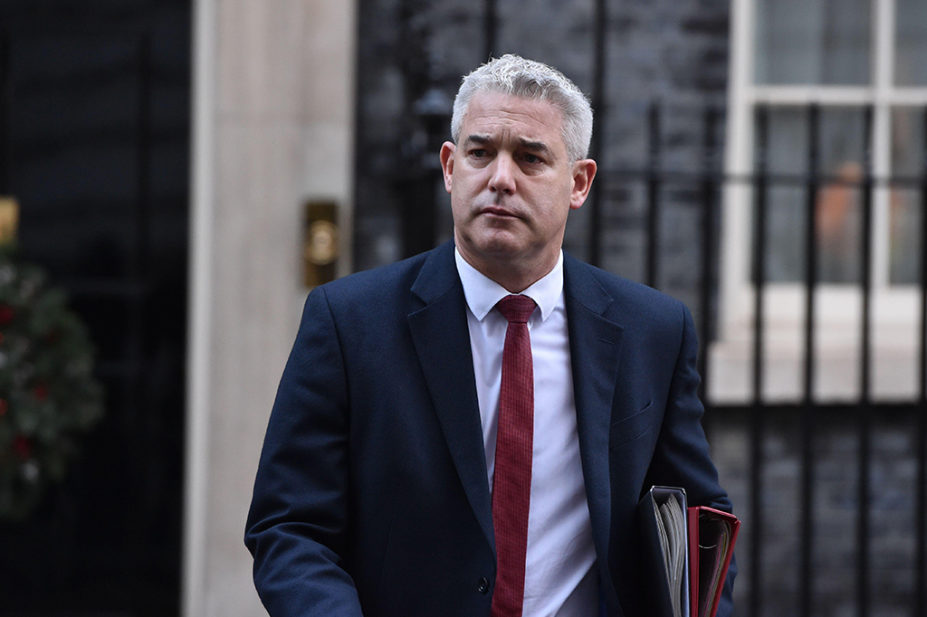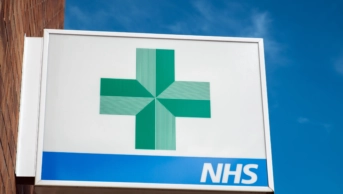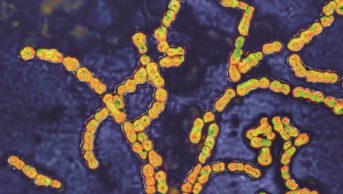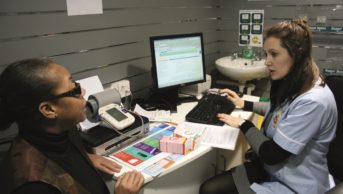
ZUMA Press, Inc. / Alamy Stock Photo
The notion of a ‘Pharmacy First’ service in England has become something of a buzz phrase for government ministers.
Most recently, health secretary Steve Barclay told the House of Commons, on 10 January 2023, that he would like to see community pharmacies “do even more and indeed as they do in Scotland”, alluding to the country’s NHS Pharmacy First minor ailments service, to help ease pressure on general practice over winter (see Box).
His speech also trailed the upcoming ‘primary care recovery plan’ that was first announced in the government’s ‘Autumn Statement’ in November 2022, which he said will include “a range of additional services” for community pharmacists to offer.
Bringing the model to England was first mooted by health secretary Sajid Javid in October 2021, when he said he was “asking my department to work with the NHS and look at a ‘Pharmacy First’ scheme for England” as part of the government’s answer to the massive release of pent-up demand on primary care services that had accumulated during the initial stages of the COVID-19 pandemic.
Since then, although negotiations are yet to start, the implementation of a national minor ailments scheme has been hotly anticipated by the sector, but what will it mean for England?
What is a ‘Pharmacy First’ service?
The term ‘Pharmacy First’ means slightly different things depending on where you live.
In Scotland, the ‘NHS Pharmacy First’ service launched in July 2020, offering anyone living in Scotland the opportunity to visit a pharmacist as their first port of call for minor illnesses, such as urinary tract infections, impetigo and acne.
Through the service, patients can access assessment, referral and free treatment for their ailment. Pharmacies receive a base payment of £1,250 each month and an activity payment from a funding pot of £785,000 if they provide a minimum of 100 consultations per month.
As of November 2021, more than 2 million consultations had been carried out through the service since its launch and, according to Public Health Scotland 2021 contract activity data, nearly 1.9 million of these occurred in the first nine months of 2021, earning pharmacies of total of £23.3m.
The number of these consultations look set to grow as Alison Strath, chief pharmaceutical officer for Scotland, confirmed on 5 November 2021 that work is underway to expand its offering to include sore throat testing.
Meanwhile, in England, there are some local minor ailments services being run, some of which are using the term ‘Pharmacy First’.
According to a services database maintained by the Pharmaceutical Services Negotiating Committee (PSNC), as of 17 September 2021, there were 22 such services ongoing in specific areas, 9 of which are commissioned by NHS England and the rest by individual clinical commissioning groups.
The treatments offered through these local services vary by area, with some only offering to treat walk-in patients with uncomplicated urinary tract infections. Others, including the ‘Pharmacy First’ service in Liverpool that launched in January 2022, enable pharmacists to treat a range of services, such as a newly launched point-of-care test and treat service for acute cough.
How do pharmacists supply medicines through these schemes?
There are two ways that pharmacists can provide treatment through minor ailment schemes.
Both the Scottish NHS Pharmacy First service and the locally commissioned services in England use patient group directions (PGDs) to supply prescription-only medicines.
PGDs provide a legal framework to allow pharmacists to supply and administer certain agreed treatments to pre-defined groups of patients without a prescription or needing to be a prescriber. Each PGD is developed locally by multidisciplinary working groups and authorised by one of five types of organisations, including clinical commissioning groups and NHS England. Therefore, under ‘Pharmacy First’ services, medicines are supplied rather than prescribed.
According to the Specialist Pharmacy Service, which supports medicines optimisation across the health service, NHS prescription charges apply to all eligible patients receiving a supply of medicines under a PGD, unless the medicines are administered by a healthcare professional under a PGD.
Prescription charges in England — currently £9.35 per item — do not apply when the medicines supplied relate to: the treatment of a sexually transmissible infection; the treatment of tuberculosis; the supply of contraceptives; or are treating a mental disorder supplied to a person subject to a supervised community treatment order.
However, in Wales, the independent prescribing service — which has been running in various forms since 2016 —allows pharmacists to prescribe from the formulary set by the local health board for a range of listed conditions, such as hay fever, athlete’s foot and eye infections. This service was rolled out from November 2021 across Wales so that health boards could start commissioning any eligible pharmacy to provide it.
In Scotland, the extended ‘Pharmacy First Plus’, which launched in September 2020, does include an element of independent prescribing. This allows pharmacist independent prescribers to manage the treatment of patients with common clinical conditions that may otherwise have needed referral to another healthcare provider, including allergies and eye infections.
The ‘Pharmacy First’ model could become an attractive option as the number of independent prescribers in England is set to increase. From 2026, all new pharmacists will be able to start prescribing at the point of registration and, in the meantime, NHS England has announced plans to set up independent prescribing ‘pathfinder’ sites from the beginning of 2023. These are expected to include NHS-funded pharmacist prescribing services based in community pharmacies.
The NHS has also committed £16m to provide fully-funded training for existing community pharmacists — including independent prescriber training, with applications having opened in August 2022 for 3,000 places.
Why are minor ailment services only commissioned in certain places in England?
The government’s latest push for a minor ailment scheme for community pharmacy is anything but new.
In April 2008, the then Department of Health published the white paper ‘Pharmacy in England: building on strengths — delivering the future’, which included plans for minor ailment schemes in all pharmacies in England.
At the time, the government said: “Pharmacy’s ready availability in more deprived areas offers enormous potential on which to capitalise and expand access to healthcare services for more disadvantaged groups or those who do not regularly use other health services.”
The expectation was that these services would be commissioned across England by April 2018.
However, in 2017, Keith Ridge, chief pharmaceutical officer for England, said clinical commissioning groups (CCGs) were beginning to decommission the minor ailments services as things had “moved on”.
Then, in October 2018, The Pharmaceutical Journal revealed that 23 of the 104 pharmacy minor ailment schemes in England had been decommissioned over the previous three years.
Some CCGs have held on to their minor ailment services, with such services still running in 22 areas of England. One local pharmaceutical committee chief officer in Liverpool has said that his local service helps “to reduce demand on the wider NHS”.
Why were the services decommissioned?
Ridge said in 2017 that minor ailment services were being decommissioned partly owing to the rollout of the ‘NHS urgent medicine supply advanced service’ (NUMSAS) in September 2016, which enabled pharmacies to provide out-of-hours emergency prescriptions to patients for any prescription-only medicine, excluding schedule 1, 2 or 3 controlled drugs.
However, NUMSAS was later subsumed into the ‘Community pharmacist consultation service’ (CPCS) in 2019 along with the ‘Digital minor illness referral service’ — providing one referral route for patients to access care from community pharmacies.
He also attributed the cuts to the NHS’s plans announced in 2018 to reduce the prescribing of common over-the-counter (OTC) products, such as paracetamol for back pain, and ‘low value’ medicines, such as liothyronine, which may otherwise have be supplied through minor ailment services.
He was referring to NHS England’s guidance for CCGs on limiting prescriptions for OTC items, which it expected to save “almost £100m for front-line care each year”. However, as of January 2019, the change in guidance had only saved £25.9m.
With this in mind, despite comparisons with the ‘Pharmacy First’ scheme in Scotland, it seems unlikely that pharmacies will revert back to providing paracetamol on the NHS.
How would an English ‘Pharmacy First’ service fit in with the ‘Community pharmacist consultation service’?
It is not yet clear how a ‘Pharmacy First’ service would sit alongside the CPCS.
Currently, under the CPCS — which launched in October 2019 — NHS 111 and general practice can refer patients with minor illnesses to a community pharmacy for free advice or referral. However, any OTC medicine recommended must be paid for by the patient and prescription-only treatments are not available from a pharmacy through this service.
Data published in June 2021 showed that 353,000 patients had been referred to community pharmacies through the CPCS since the service began; however, pharmacists are unable to claim funding for similar consultations carried out with walk-in patients who were not referred into the service.
The PSNC launched a third ‘Pharmacy Advice Audit’ during the week commencing 31 January 2022 to build a case for funding pharmacist consultations with walk-in patients.
The audit found that pharmacy staff conduct 65 million unfunded patient consultations annually with 80.7% “as a result of patients self-referring into the pharmacy” and the remaining 19.7% “due to patients not being able to access the part of the health system they initially required or being informally referred outside of the nationally commissioned NHS Community Pharmacy Consultation Service (CPCS)”.
The PSNC has estimated that a minor ailment scheme in England could save the NHS up to £640m per year by transferring 40 million GP appointments to pharmacies.
Doing so would be a major step towards providing a service similar to what is already offered in Scotland and parts of England, which do not rely on referrals from other providers.
Would GPs support a pharmacy minor ailments service?
According to their representative body the Royal College of GPs (RCGP), GPs are in support of a national minor ailments scheme rollout.
A joint report, published by the RCGP and the Royal Pharmaceutical Society (RPS) in November 2021, called on the government to develop an independent prescribing service for community pharmacists in England. It appealed for their role to be expanded to manage minor illnesses, resembling the ‘Pharmacy First’ and ‘Pharmacy First Plus’ services in Scotland.
The report said setting up such a service in England would resolve one of the main barriers to GP participation in the CPCS — namely an inability for pharmacies to ‘close’ some CPCS consultations because the patient required a prescription-only medicine (POM), along with advice.
Instead, pharmacists are required to refer patients back to general practice for an appointment with a physician who can prescribe the necessary medicine.
“This was seen to produce extra workload on general practice, taking up additional appointment slots, delaying care for the patients, and potentially widening health inequalities, despite community pharmacists being more than capable of completing the episode of care and supplying a medicine,” the report said.
“While the CPCS has the offering to be extremely helpful, a more advanced service, which included the supply or prescribing of POMs by community pharmacist for minor ailments, would help general practice and patients even further.”
How far have discussions progressed in implementing a national minor ailments scheme in England?
The extent of discussions between the sector and the government on this are unclear.
In November 2022, the PSNC said that they were in renewed discussions with the DHSC about setting up the service, having previously presented a business case for it during negotiations for the final two years of the ‘Community pharmacy contractual framework’. The service ultimately did not feature in the agreement that was announced.
More recently, the PSNC suggested that while these new discussions had started, negotiations had not. “We remain ready to start negotiations on this as soon as they want to,” the statement said.
The PSNC’s comments came in response to a speech given by Barclay on 9 January 2023, in which he said the government “will work with community pharmacists to tackle barriers to offering more services”, which will help mitigate pressures on the NHS, alluding to the service already in place in Scotland.
But calls for a ‘Pharmacy First’ service in England have been coming from all corners of the profession. In December 2022, the chief executives of the four biggest UK pharmacy chains — the PSNC, National Pharmacy Association, Company Chemists’ Association and the Association of Independent Multiple Pharmacies (AIMP) — all wrote to the health secretary, calling on him to introduce a ‘Pharmacy First’ service in England.
Then, in January 2023, Jay Patel, AIMP board member and executive director of Day Lewis, called for the service during an ‘NHS Recovery Forum’, led by the prime minister to identify opportunities to improve NHS performance and outcomes.
A Pharmacy First scheme for England “was AIMP’s principal message”, conveyed by Patel at the forum, said Leyla Hannbeck, chief executive of the AIMP. “A pharmacy first scheme has historically presented a challenge for negotiators to land in recent years.
“It is clear barriers have existed to the notion of efficacious products being available readily through the pharmacy network — we hope that this is now fast tracked … in the light of huge capacity challenges facing the NHS,” she said.
The DHSC appears to have begun discussing this internally, having responded to a freedom of information request in January 2022, suggesting that policy development in this area is already underway.
Box: Key quotes
Maria Caulfield, pharmacy minister, January 2022: “We are looking towards a more pharmacy-first model as in Scotland and Wales, where patients can go direct to pharmacists without necessarily going first to the GP, opening up primary care and making it much more accessible.”
Martin Marshall, chair of the Royal College of GPs, November 2021: “Pharmacists are highly trained and highly trusted healthcare professionals, who can play a vital role in supporting people with a range of minor ailments, freeing up GPs’ time for patients with complex health needs.”
Alastair Buxton, director of NHS Services at the Pharmaceutical Services Negotiating Committee, November 2021: “The PSNC wants the walk-in advice that pharmacies are now providing to be fully funded, and we were pleased to hear the secretary of state supporting an extended role for pharmacists in supporting people with minor conditions.”
Sajid Javid, health secretary, October 2021: “I’m asking my department to work with the NHS and look at a ‘Pharmacy First’ scheme for England, so pharmacists can provide treatment for specific conditions such as sore throats, without patients having to go to their GP — building on pilot schemes in England and much as they already do in Scotland.”
This is an updated version of an article previously published in February 2022.


